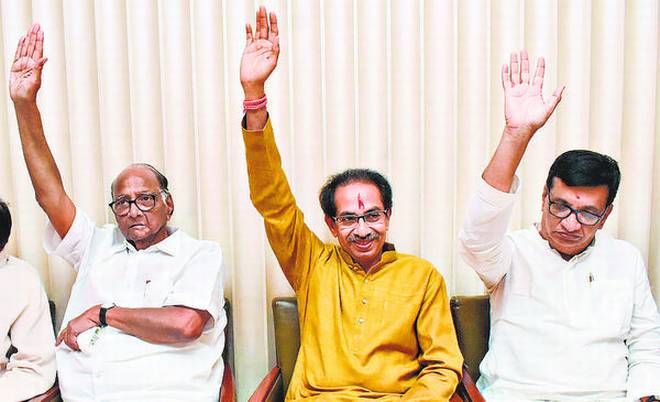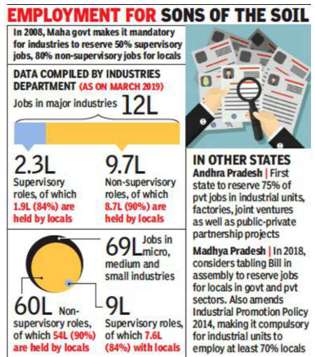
The newly-formed Maharashtra state government has decided to make it mandatory for all upcoming industries to employ 80 percent local staff, The Times of India reported.
Keeping in line with the draft common minimum programme, officials from the state industries department said they would make it mandatory for industrial investors and corporates which have signed Memoranda of Understanding (MoUs) with the state government to provide 80% jobs to locals if they wanted to avail benefits and tax incentives.
The state industries department is revisiting the industrial policy and said that this clause would be included in the MoU itself instead of serving as a mere guideline, with officials stating that the move would incentivize job creation instead of investments. Under the new policy, it will also be mandatory to audit employment generation to ensure that incentives are given to those who follow the guidelines.
State Industries minister Subhash Desai, a member of the Shiv Sena, gave the details at a press conference in August and added that it would be mandatory for these industries to source a specified percentage of raw materials from small and medium enterprises in the area where their business are set-up.
On the cards of the government is a Marathi language university, a cultural university in Nashik to preserve Marathi literature, a low-cost ‘Marathi asmita’ tab loaded with classic Marathi literature and at least one Marathi library in every gram panchayat jurisdiction in Maharashtra, The Print reported.
So, who are the ‘locals’?
The first Government Resolution (GR) passed by the Industry, Energy and Labour Department in 1968, defines a ‘local person’ as one who has completed minimum of 15 years residence in the State of Maharashtra.
On its website, the Directorate of Industries states, “With a view to get appropriate share in the economic benefit from industrial development and to eradicate unemployment of local persons, the State Government has adopted the policy of preferential treatment to local person since 1968. For effective implementation of this policy, the State Govt.”
As per the revised procedure in 2008, “All Micro, Small, medium, large and mega industrial enterprises has to ensure that minimum 50% supervisory staff and minimum 80% other employees including supervisory category will be local persons.”
The GR also said that candidates must be able to speak Marathi and should have a domicile certificate.
According to the data accessed by The Times of India from the state industries wing, as on March 2019, 10 lakh jobs in 3,052 major industries are held by locals. In the micro, small and medium industries, nearly 61.6 lakh jobs (89.3%) were held by locals.

(Source – Times of India)
The 80% job reservation for locals appears to reiterate the Shiv Sena’s commitment to the ‘Sons of the Soil’ concept. This underlines the view that a state belongs to the main linguistic group inhabiting it and these inhabitants are its ‘local residents’. Others who are settled there, but whose mother tongue isn’t the state’s main language are seen as ‘outsiders’.
Shiv Sena has always been at the forefront of this movement, for they were upset by three other groups; the Gujaratis, the South Indians and the labour class of Northern India. The demand of the Shiv Sena for preference to the natives has come up time and again through decades – for better employment, better education, funding opportunities and better livelihoods than the outsiders.
In 2003, then Shiv Sena leader Raj Thackeray, who now leads the Maharashtra Navnirman Sena (MNS) spearheaded the ‘Mumbai for Marathis’ stir which targeted outsiders, mainly the North Indians. He went around central and south-central Mumbai warning North Indians to ‘Quit Mumbai’.
During the same period the current CM of Maharashtra Uddhav Thackeray was leading the ‘Mee Mumbaikar’ campaign – a more inclusive one to win over the non-Marathi ethnic and linguistic minority groups in the wake of the elections to be held at the time.
The Sena was born out of the Samyukta Maharashtra movement that fought for Maharashtrians to be given first preference in all arenas in the state after it felt threatened by an alleged take over of job, especially white-collar ones, by South Indians. Bal Thackeray, the late Sena Supremo called on the angst of the ‘locals’ to persecute the ‘others’ forming a sort of ‘sub-nationalism’ based on language and religion. He had once infamously declared, “All the lungiwalas are criminals, gamblers, illicit liquor distillers, pimps, goondas and communists. I want the illicit liquor distiller to be Maharashtrian the goondas to be Maharasthrians, pimps and gamblers to be Maharashtrians.”
After stoking the fire, it changed its political strategy and took a softer approach towards the hostility towards outsiders. After the declarations in the common minimum programme, it is yet to be seen whether the Sena will revisit the Sons of the Soil movement, or will it shed its xenophobia to be more inclusive towards all the ‘locals’ of Maharashtra.
Related: